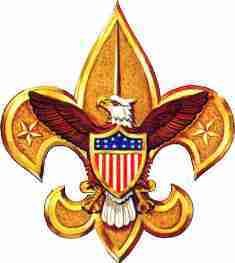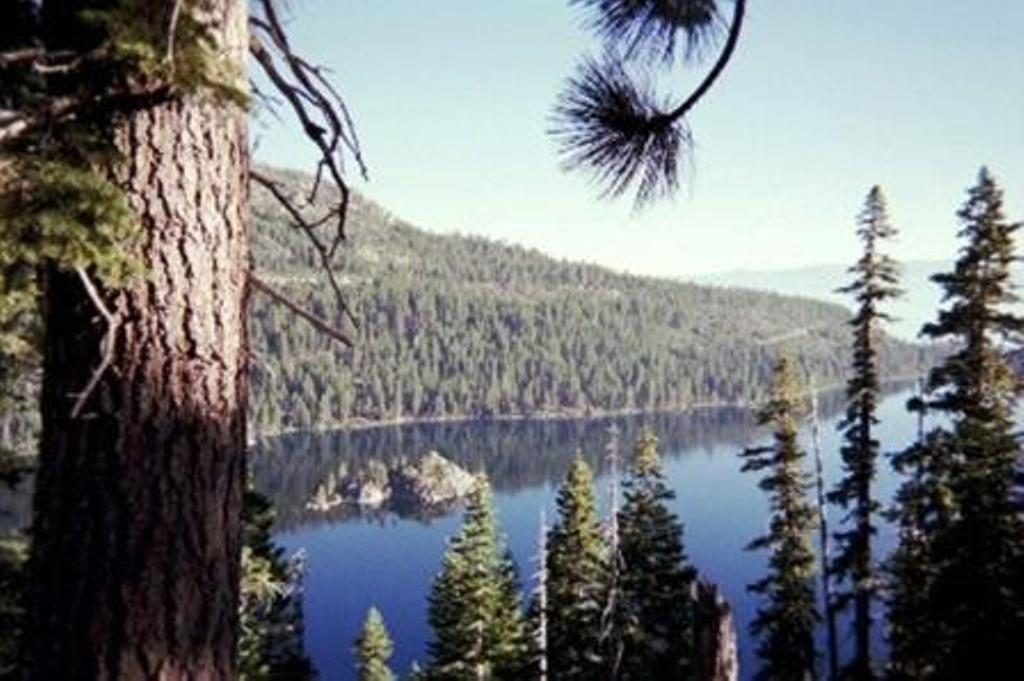with truth, wisdom, courage, and humor.)
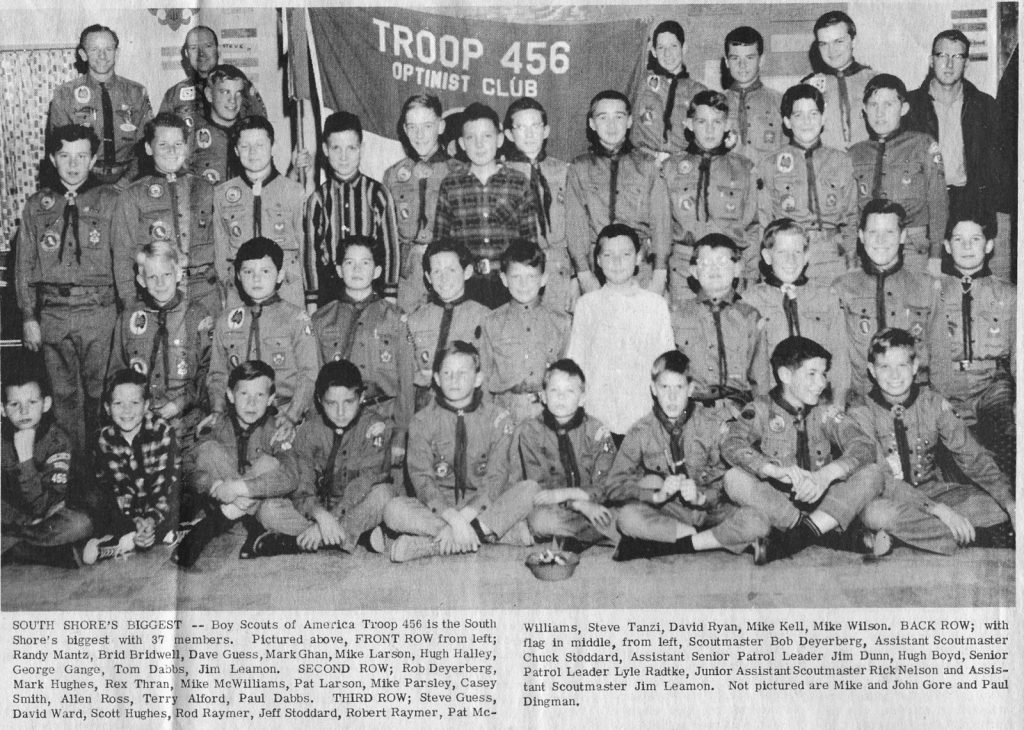 |
| Click on the image to enlarge. |
Some adults have memories of their time in the Boy Scouts. Like always, there are those memories which remind us of good, bad, embarrassing, and funny incidents occurring during campouts and even the weekly troop meetings. The following are three of my favorite memories. All these events occurred from 1963-65, while I served as the Senior Patrol Leader of BSA Troop 456 of South Lake Tahoe, CA (Golden Empire Council) where I pretty much ran the troop under the guidance of the Scout Master, Bob Deyerberg.
1. One of my responsibilities as the Senior Patrol Leader was to ensure that the Patrol Leaders were properly training and testing their assigned scouts in the requirements for rank advancement. One night I was sitting-in on an oral test of a second class scout working towards his first class badge. The scout, Paul, was doing very well answering the questions correctly until he was asked to name ten edible wild plants. Paul named off nine very quickly and then (like many of us presented with the task of naming ten items on a list) he had a “brain lockup”. After much silence and some very minor harassment (I mean encouragement) by his patrol leader, Paul finally and confidently blurted out—“road apples”. After the rest of us finished laughing and explained to Paul exactly what a “road apple” was (horse droppings), he managed to name a correct one and passed that test.
2. One summer campout, we were camping near the ruins of an ore crushing stamp mill along the Carson River in the desert near the eastern edge of Carson City, Nevada. During the second night, all scouts were gathering around the fire pit for our campfire activities. Bob, our Scout Master, was acting strange which is to say that he had a shopping bag with stuff in it but would not let us see what was inside; very mysterious and so unlike him. After we had held our fire starting ritual and finished our singing, it was time for stories. A few scouts told some simple ghost stories while others told funny ones in their turn.
At last it was time for Bob to reveal the contents of the bag he was guarding. The contents were: an enameled bowl of a size used to water a pet dog; a short length of cotton clothesline; and stick long enough to span the diameter of the bowl; and a block of paraffin. While telling his story, Bob placed the paraffin in the bowl and set the bowl close to the campfire so as to melt the paraffin; then cut the clothesline into three ten-inch long pieces and tied the tops to the stick with the center piece in the middle with the others a short space on either side.
This is the “Reader’s Digest” version of his story. In ancient times a large tribe of Indians lived in this area; on the desert of the Carson Valley. They hunted in the desert and also in the Sierra Nevada Mountains for game to feed and clothe the tribe. One year the desert game became scarce and the mountain game was virtually non-existent. Hunting parties returning from unsuccessful hunts reported seeing the tracks of some gigantic beast. They believed that this beast must be either killing the game or scaring the game away. The tribe brought the matter to the attention of the tribal chiefs.
This tribe was lead by three chiefs of equal rank and authority. Each chief contributed his talent to the group of three and thus they led with confidence and the tribe prospered. The chiefs were named: Brave Eagle, Wise Eagle, and True Eagle. The three chiefs concluded that they were the only ones who could defeat this beast so they set out alone into the mountains to hunt it down. Several weeks passed before they found the beast sleeping. After locating the beast, the chiefs set up a relay as each of them in turn acted as bait for the beast running themselves nearly to death as they tired the beast. Finally, the last of the chiefs to run, Brave Eagle, led the beast onto a thinly frozen lake; the beast broke through the ice and drowned.
The chiefs had been gone much longer than the tribal members had patience so after two weeks the tribe sent their fastest runner, Swift Eagle, to go find out how the hunt was going and if everything was alright. In spite of being fast, Swift Eagle could only but follow the trail signs left by the chiefs who were quite swift themselves. So, he could only slowly catch up to them. When he finally realized that the beast was chasing the chiefs, Swift Eagle tried to run even faster. At last he found the first of the three chiefs, Wise Eagle, on the verge of death. Swift Eagle began lamenting the impending loss of the chief saying what would the tribe do without his wisdom. The chief told him to cut some hair of the back of his head to burn at council fires so his wisdom would always be with them. So he cut the hair and the chief died.
Swift Eagle came upon the other two chiefs in turn and those chiefs also had him cut off some of their hair before they also died. Swift Eagle returned to his tribe, told them of the chiefs’ fates and their command about what to do with their hair. The tribe obeyed and they once again prospered.
By the end of the story it suddenly became clear to me what Bob was intending to do. He placed the stick with the pieces of clothesline across the bowl of the now melted paraffin and announced that we were all going to put some hair from the back of our heads into the bowl so we could burn it at every one of our “council fires” at the close of each troop meeting. As I was the oldest and the “leader” of the troop, Bob selected me to be cut first to set the example. (At the time, I was a sophomore in high school and really didn’t want to explain why I was missing hair on the back of my head to my peers, but I couldn’t “wimp” out.) Then one by one, every scout present had a fifty-cent coin size of hair cut by Bob from the back of their head. Bob went last and I got to do the honor. Bob was cut and cut and cut. I didn’t go overboard but his cut spot was larger than a fifty-cent piece.
3. That same summer our troop was camping along the Carson River but about 25 to 35 miles east of Carson City. George was an 11-year old, fair skinned, short, skinny boy with “toothpick” arms and legs and was completely ill equipped for his first scout campout. George’s biggest problem was what some swindler sold to his parents as a sleeping bag. Desert nights can be very cold and George’s sleeping bag was not designed to be used in temperatures under 70° and George did not appear to have even an ounce of fat on his frame to help keep him warm.
Ultimately, to keep George healthy and not to be so discouraged that he would quit, Bob swapped sleeping bags with George. As a result, Bob spent the night sleeping next to the campfire he had to keep refueling throughout the night until he moved into his car to escape an early morning cold breeze.
George did not appear to be your run-of-the-mill boy. His interests seemed to center on bugs, little critters or creatures, and aquatic life forms. Even so, no one treated him disrespectfully or made fun of him behind his back; at least I never heard of any.
The next morning after sleeping in his car and around the campfire, Bob was not in the best of moods (understatement). About mid-morning he had to keep telling some of the scouts to stay out of the water. One scout had discovered crayfish in the river and soon several scouts were trying to “harvest” a few for lunch. Some “fished” with strips of bacon, but some waded right in and came out wet into chilly air; hence the stay-out-of-the-water order. Nonetheless, about an hour later, Bob looked about and spied George up to his knees walking in the water wearing his socks and leather shoes. Bob told him to get out and when George complied Bob asked him, “Why were you walking in the river?” I suspect George was simply pursuing his interest in aquatic life, but his reply was, “Well, I’ve always liked water sports.”
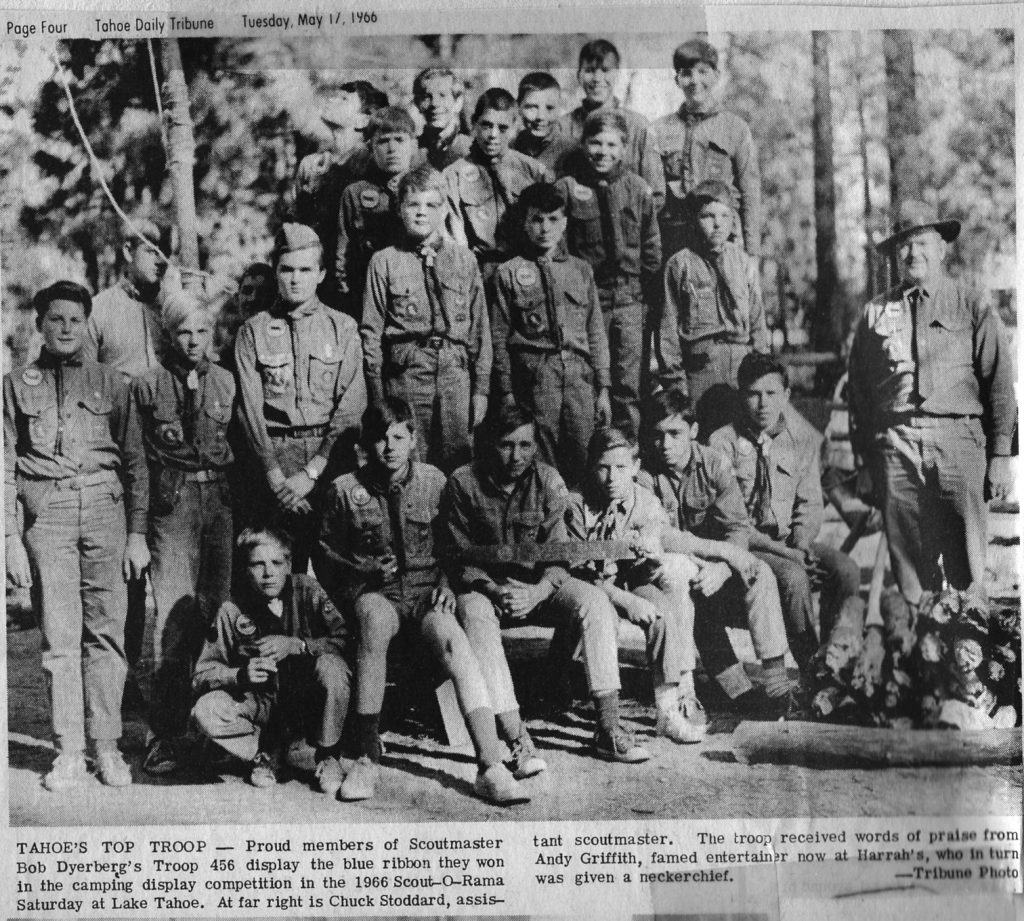 |
| I’m the boy wearing a hat. |
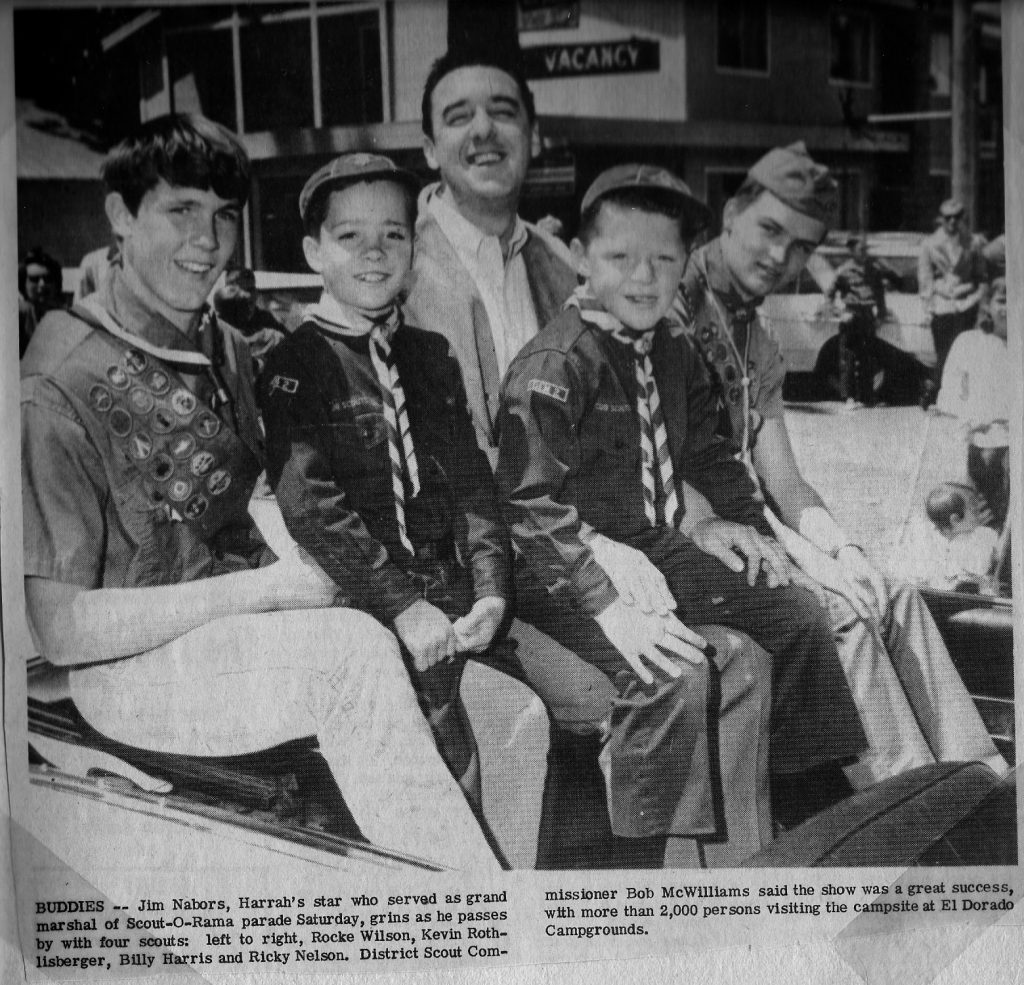 |
| At the time, none of us knew Jim Nabors was gay. |
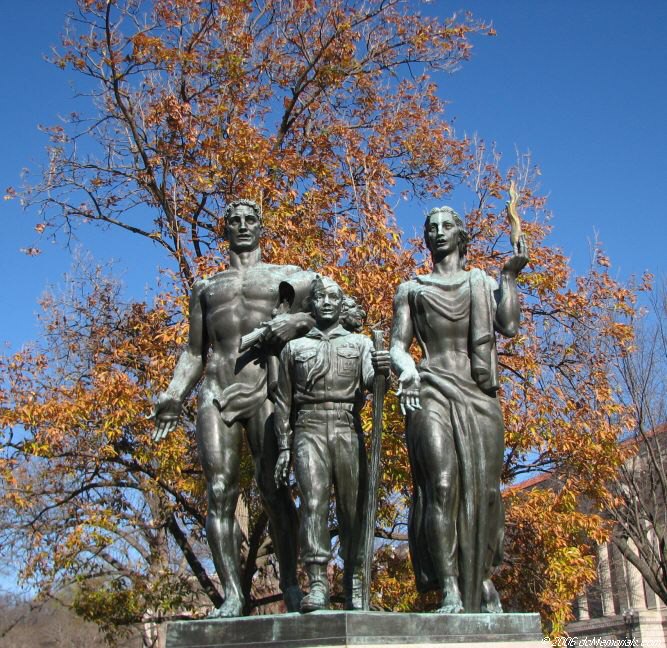 |
| Boy Scout Memorial in Washington D.C. — Notice the naked adult male. |
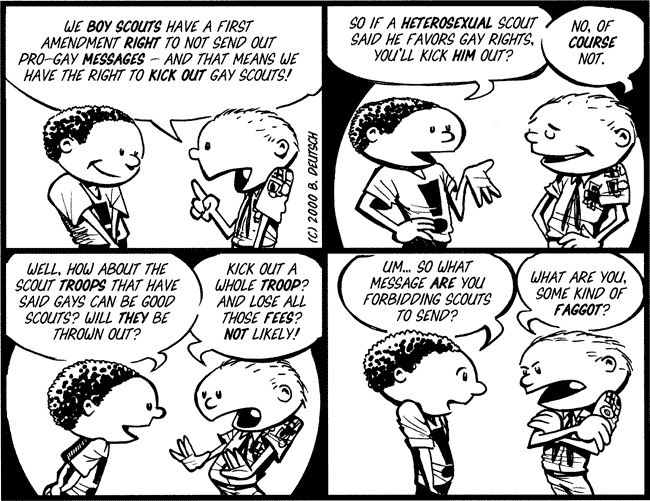 |
| The BSA prevented me from becoming a delinquent. I thought the program was to create good citizens, not to teach discrimination. |
© 7 March
2011
About the Author
When reunited with his mother and new stepfather, he lived one summer at Emerald Bay and then at South Lake Tahoe, graduating from South Tahoe High School in 1966. After three tours of duty with the Air Force, he moved to Denver, Colorado where he lived with his wife of 27 years and their four children. His wife passed away from complications of breast cancer four days after 9-11.
He came out as a gay man in the summer of 2010. He says, “I find writing these memories to be very therapeutic.”
Ricky’s story blog is “TheTahoeBoy.blogspot.com”.
